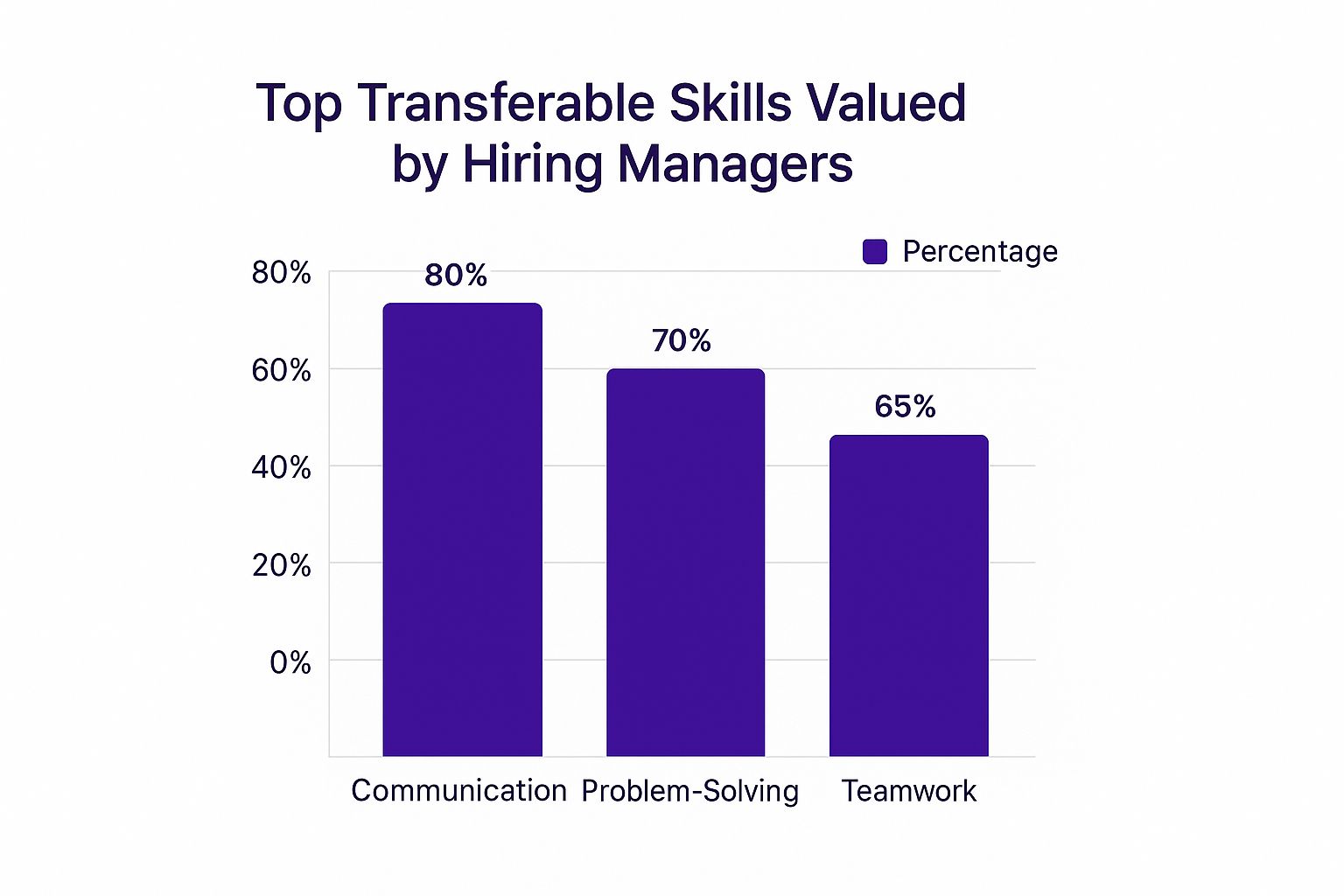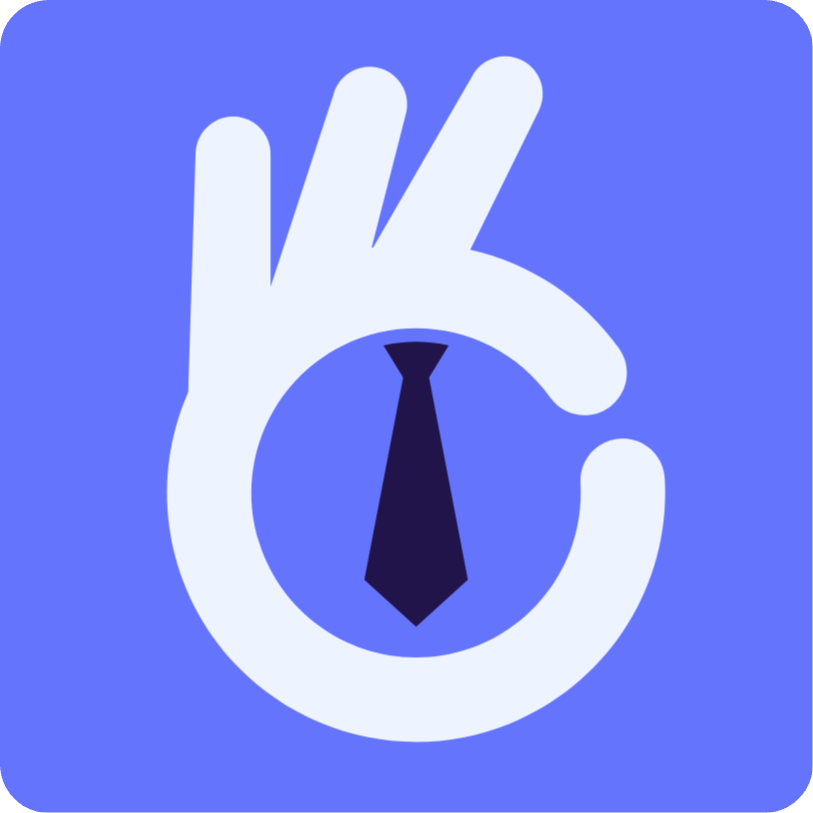How to Get Hired with No Experience: Skill-Building Tips
Trying to land a job with zero experience can feel like you're stuck in a loop. You know the one: "You need experience to get a job, but you need a job to get experience." It’s a classic Catch-22, but I’ve got good news for you. The hiring world is changing, and the solution is surprisingly simple: focus on your skills, not your lack of a job history.
Companies are finally catching on that what you can do is far more valuable than where you've worked before. This guide will show you exactly how to prove your worth and potential to get hired, even if your resume looks a little bare.
A New Era: The Shift to Skills-Based Hiring
The rules of the hiring game have quietly been rewritten, opening up a ton of new opportunities for people just starting out.
This isn't just a fleeting trend. It’s a fundamental shift driven by a new reality: a candidate's potential and ability to adapt are way more valuable than a rigid list of past job titles. Industries are evolving so fast that the skills needed today might be obsolete tomorrow. This makes your ability to learn, solve problems, and work with others the real prize for employers.
What This Really Means For You
This shift puts the power right back where it belongs—in your hands. Instead of worrying about what you haven't done, you can now build a compelling story around what you can do. The trick is to spot the transferable skills you already have from school, personal projects, or even just life itself.
Think about it this way:
- Project Management: Ever organized a group project for a class or planned a big family get-together? That's project management in action.
- Communication: Have you ever given a presentation, convinced your friends to see your favorite movie, or even just clearly explained a complex idea? That's communication and influence.
- Problem-Solving: Ever troubleshooted a Wi-Fi issue for a relative or figured out a shortcut to get your errands done faster? That’s genuine problem-solving.
Pinpointing Your Hidden Talents
The secret is learning to see your background through the eyes of a hiring manager. They aren't just looking for a carbon copy of the person who left the role; they're looking for someone with the foundational skills to succeed.
This chart breaks down the top transferable skills hiring managers are dying to see in candidates.

As you can see, soft skills like communication, problem-solving, and teamwork aren't just fluff—they're your golden ticket. They are universally valued and can become your secret weapon in the job search.
The numbers back this up. Over the past two years, a massive 40% of entry-level job postings have dropped their rigid experience requirements. This is opening the floodgates for candidates without a traditional work history.
Industries like tech and digital marketing are leading the charge. In fact, 65% of their hiring managers now use skills tests or project-based interviews to find top talent—a huge leap from just 30% in 2020.
To help you get started, this table summarizes the key strategies you should focus on. Think of it as your game plan for landing that first great job.
Key Strategies for No-Experience Job Seekers
| Strategy Pillar | Your Action | Why It Works |
|---|---|---|
| Skills Identification | Audit your life, school, and project experience for transferable skills like communication, problem-solving, and teamwork. | It shifts the focus from a lack of job titles to a wealth of practical abilities that employers actually want. |
| Resume & Portfolio | Build a skills-focused resume. Create a simple portfolio (even just a Google Drive folder) showcasing projects that prove your skills. | This provides concrete evidence of your capabilities, making your potential tangible and believable to recruiters. |
| Networking | Connect with people in your desired field. Conduct informational interviews to learn, not just to ask for a job. | It builds relationships, gives you insider knowledge, and puts you on the radar for unadvertised opportunities. |
| Interview Preparation | Prepare stories using the STAR method (Situation, Task, Action, Result) to demonstrate how you've used your skills. | It helps you answer "Tell me about a time…" questions confidently and proves you can apply your skills in real-world scenarios. |
Focusing on these pillars will help you build a compelling case for why you're the right person for the job, regardless of what your work history section looks like.
Your resume might be light on job titles, but it can be heavy on proven skills. The challenge isn't gaining experience—it's learning how to effectively showcase the experience you already have.
By building a professional story that highlights your capabilities, you’ll grab the attention of recruiters and prove you have what it takes. To keep everything organized and make a killer impression, check out our guide on how to get hired faster by managing your applications like a pro. This is your roadmap to breaking the cycle and landing that job.
Build Skills That Employers Actually Want

Let's be real: formal experience isn't the only thing that gets you hired anymore. Practical, in-demand skills are the new currency. When you're trying to figure out how to land a job with no experience, what you can do will always speak louder than a blank spot on your resume.
The trick is to stop guessing what companies want and start proving you have the skills they're looking for right now.
Think of yourself as a detective. Your first assignment is to tear apart job descriptions for the roles you want. Don't just skim them—dissect them. Hunt for recurring keywords, software, and abilities that pop up again and again. You're not just looking for a job; you're spotting a pattern of demand.
Your real goal here is to reverse-engineer the perfect candidate. By finding the common threads in a dozen job posts, you can build a learning plan that's a direct response to what the market is actually asking for.
Identify the Core Competencies
As you go through job postings, you'll see skills tend to fall into two buckets: hard skills and soft skills. Hard skills are the teachable, technical things. Soft skills are all about how you show up and work with other people. You absolutely need a solid mix of both.
- Hard Skills: These are the specific, measurable abilities employers list as "must-haves." Think things like data analysis, knowing your way around the Adobe suite or Microsoft Office, a specific programming language, or even familiarity with project management tools.
- Soft Skills: These are the personal qualities that make you someone people want on their team. Critical thinking, clear communication, being adaptable, and genuine problem-solving are always at the top of a hiring manager's list.
A good example? A marketing coordinator role might list "SEO knowledge" (a hard skill) and "strong collaboration skills" (a soft skill). Your mission is to find ways to prove you have both.
Now, the job market is definitely competitive. We've seen an 11.2% drop in the total number of entry-level jobs in major markets between Q1 2021 and Q2 2024. But that's not the whole story. At the same time, there's been a 30% surge in entry-level roles that require AI-related skills like prompt engineering and data literacy.
This tells us something huge: you have to focus on the skills of tomorrow, not yesterday. You can get more details on these entry-level hiring trends for 2025 to see where things are headed.
Acquire Skills Through Action
Okay, so you've identified the skills you need. Now it's time to actually get them. Waiting for a job to teach you is a recipe for disaster. You have to be proactive and create your own experience.
Build Tangible Proof with Personal Projects
This is, without a doubt, the most powerful thing you can do. A personal project is concrete evidence of your skills, your drive, and your passion for the field. It’s something you can show, not just talk about.
Project Ideas to Get You Started:
- Aspiring Marketer? Create a mock social media campaign for a local coffee shop. Map out the strategy, design the graphics, and write the ad copy.
- Future Data Analyst? Grab a public dataset on a topic you love (sports stats, movie ratings, anything!). Clean it up, analyze it with Excel or Python, and build a simple dashboard to show your findings.
- Wannabe Web Developer? Build your own portfolio website from scratch. This doesn't just prove your coding skills; it gives you the perfect place to showcase all your other projects.
Use Online Courses and Certifications Strategically
Platforms like Coursera, Google Career Certificates, and Udemy are goldmines for building specific, job-ready skills. A certification in a high-demand area like "Google Analytics" or "AWS Cloud Practitioner" can be a fantastic signal to employers.
But here’s the key: don't just collect digital badges. The real magic happens when you apply what you learn. Finish a course, then immediately use that new skill in a personal project.
That one-two punch—learning then doing—is what makes you a compelling candidate. When you focus on this cycle of identifying, building, and proving your skills, you make your lack of formal experience a complete non-issue.
Craft a Resume That Showcases Your Potential

When you don't have experience, your resume feels like your biggest hurdle. A traditional resume that lists jobs chronologically only highlights what you're missing. It’s time to stop thinking that way.
Your resume isn't a history report; it's a marketing document. You need to sell your potential, not your past. This means shifting the focus from a timeline of jobs to a showcase of your actual abilities.
That’s where a skills-based resume changes the game. It’s your secret weapon. Instead of leading with a "Work Experience" section that’s blank, you lead with sections that prove what you can do. This strategic flip immediately shows a hiring manager what you bring to the table.
Your Summary: Make a Powerful First Impression
The first thing a recruiter sees is your resume summary. Those 2-3 sentences need to pack a punch. This is your elevator pitch, and it absolutely cannot say, "Recent graduate looking for a job."
You need to project confidence and clearly state your skills and goals.
Weak Summary:
Eager and motivated recent graduate looking for an opportunity in marketing. A fast learner with a positive attitude.
Strong Summary:
A highly motivated and creative individual with proven skills in social media management, content creation, and data analysis developed through rigorous academic projects and personal initiatives. Seeking to apply a strong understanding of digital marketing principles to drive brand growth in an entry-level marketing role.
See the difference? The second one is specific. It uses keywords from the industry and smartly frames academic work as real-world experience. It sets a professional tone from the get-go.
Your Skills Section: Show, Don't Just Tell
This is where the magic happens on a skills-based resume. Don't just list vague words like "Communication." That tells a recruiter nothing. Instead, group your skills into categories that make sense for the job you want and—this is key—add proof.
For instance, if you’re aiming for a project management role, you might lay it out like this:
Project Coordination & Management
- Successfully planned and executed a 3-month university group project for 5 team members, delivering the final presentation two days ahead of schedule.
- Proficient in using Trello and Asana to track tasks, set deadlines, and monitor progress for personal and academic projects.
Technical Proficiencies
- Software: Microsoft Office Suite (Word, Excel, PowerPoint), Google Workspace (Docs, Sheets, Slides), Canva
- Social Media Platforms: Instagram, TikTok, LinkedIn, Facebook Business Suite
This approach does so much more than just list what you know. It gives mini-examples of you actually using those skills.
Resume Section Comparison Traditional vs Skills-Based
To really see the difference, let’s compare how you might frame your qualifications on a standard resume versus a skills-based one. This simple switch in focus can be the difference between getting an interview and getting ignored.
| Resume Section | Traditional Approach (Less Effective) | Skills-Based Approach (More Effective) |
|---|---|---|
| Summary | "Seeking entry-level role." | Highlights key skills and career goals. |
| Top Section | "Education" or "Work Experience" (often blank). | "Summary of Skills" with categories. |
| Experience | Lists part-time jobs unrelated to the desired field. | "Relevant Projects" section detailing academic or personal work. |
| Skills | A simple, generic list of soft and hard skills. | Skills are integrated with bullet points showing real-world application. |
The skills-based approach is a narrative that proves your value, making the lack of a formal job history irrelevant.
Your Projects Are Your Experience
Your "Work Experience" section might be empty, but that doesn't mean your "Experience" section has to be. Just rename it. Call it "Relevant Experience" or "Project Experience."
Here, you'll break down your most important work from school, volunteering, or even passion projects you did on your own. Treat each project like it was a job. Give it a title, a timeframe, and use bullet points to detail what you did and the results you got.
Example Project Entry:
Mock Social Media Campaign for a Local Business | Personal Project
January 2024 – March 2024
- Developed a comprehensive 3-month social media strategy for a local café, focusing on increasing brand awareness among university students.
- Created 30+ unique pieces of visual content using Canva, resulting in a projected 25% increase in engagement based on platform analytics.
- Wrote compelling ad copy for mock Facebook and Instagram campaigns, tailored to specific audience segments.
This demonstrates initiative, practical skills, and a results-driven mindset—exactly what employers are desperate to see. You're literally creating your own proof of work.
Finally, make sure all your application documents tell the same powerful story. As you build out these project descriptions, you want your cover letter to match. A good job cover letter generator can help you align your letter with the skills-focused narrative you've just built, ensuring your entire application is polished and consistent.
Use Networking to Create Opportunities
When your resume feels a little light, your professional network can add some serious weight. If you're trying to land a job with no formal experience, building connections isn't just a "nice-to-have"—it's your secret weapon. This is how you tap into the hidden job market, where countless roles get filled before they ever see the light of day on a job board.
Let's ditch the old, stuffy idea of networking. Forget the awkward handshakes and transactional pitches. Think of it as just being curious and building genuine relationships. Your goal isn't to walk up and ask for a job. It's to ask for advice, gather intel, and connect with real people in the field you're excited about. This mindset shift turns a dreaded chore into a powerful learning experience.
Start With Who You Already Know
Believe it or not, your network is much bigger than you think. It's not just about tracking down CEOs. It starts with the people already in your circle.
- Friends and Family: Let them know what you’re exploring. You never know who they know. A casual mention can lead to a game-changing introduction.
- Former Classmates and Professors: These people have seen your work ethic firsthand and can speak to your potential. A glowing recommendation from a professor can be incredibly impactful.
- Alumni Networks: Your college alumni database is a goldmine. People are often surprisingly willing to help someone who went to the same school.
Just make a simple list of these folks. A quick, friendly message explaining what you're trying to do is the perfect, low-pressure way to get the ball rolling. You'll be surprised how many are happy to offer a bit of guidance.
Master the Art of the Informational Interview
The informational interview is your single most valuable tool. It's just a short, casual chat where you get to ask someone about their career, their company, and how they got there. Notice the key difference: you're not asking for a job. You're asking for their story.
This completely flips the dynamic. Instead of being under pressure to impress, you're giving them the floor to share their expertise—and people love doing that.
The best way to build a real connection is to make the other person feel valued. An informational interview does exactly that by putting the focus on their knowledge and experience. This creates a genuine rapport that can open doors down the road.
Your outreach can be simple. Let’s say you find a marketing manager on LinkedIn who works at a company you admire. Your message could look something like this:
Sample Outreach Message
"Hi [Name], I'm a recent graduate passionate about breaking into digital marketing and was so impressed by the recent [mention a specific campaign or project] at [Their Company]. I know you're incredibly busy, but I was wondering if you might have 15 minutes in the next few weeks for a quick chat? I'd love to hear more about your career path and any advice you have for someone just starting out."
This works because it's specific, it's respectful of their time, and it focuses on asking for advice, not a handout. People are far more likely to say yes to a 15-minute chat about themselves than to a random request for a referral.
Turn Conversations Into Real Opportunities
During the chat, your main job is to listen and learn. Go in with a few thoughtful questions ready.
Questions to Ask in an Informational Interview:
- What does a typical day actually look like in your role?
- What are the most rewarding parts of your job? What are the toughest?
- What skills do you think are most critical for succeeding in this field right now?
- What's one piece of advice you'd give to someone trying to break in without direct experience?
Before you wrap up, always ask this killer question: "Is there anyone else you think would be helpful for me to talk to?" This simple question can turn one conversation into three or four, expanding your network exponentially.
Finally, always send a thank-you note within 24 hours. A quick email acknowledging their time and help solidifies the great impression you just made.
Building connections takes time, but it's an investment that pays off big. Each conversation gives you insider knowledge and puts you on people's radar. To dive deeper into making these connections count, check out our guide on successful job search networking. When a role finally opens up, you'll be the person they think of first.
Prepare for the Interview and Prove Your Value

Getting the interview is a huge win, especially when you feel like you're starting from scratch. It means your skills-first resume and project portfolio hit the mark. Now for the final boss: proving you’re the right person for the job, not just on paper, but in person.
This is where you turn all that potential into solid proof. For anyone wondering how to get hired with no experience, this part of the process is less about reciting old job duties and more about telling compelling stories that bring your skills and drive to life.
Your main job here is to connect the dots for the hiring manager. You need to show them exactly how the skills you picked up from projects, coursework, or even volunteering will create real value for their company.
Reframe Your Experience with the STAR Method
That dreaded question, "Tell me about your experience," can feel like a trap when you don't have a list of past jobs. This is where the STAR method (Situation, Task, Action, Result) becomes your secret weapon for storytelling. You’ll just swap out work examples for project examples.
Think back to a tough group project, a personal website you coded from the ground up, or a volunteer event you helped run. Now, frame it using STAR.
- Situation: First, set the scene. "In my digital marketing course, our final project was to build a complete social media strategy for a mock startup with a zero-dollar budget."
- Task: Next, explain your specific role. "I was responsible for doing the audience research and mapping out the content calendar for the first 30 days."
- Action: Then, detail the actual steps you took. "I built some quick polls with free survey tools, scouted competitor accounts to find content gaps, and designed a week's worth of posts using Canva."
- Result: Finally, share the outcome—and make it count. "Our project ended up with the highest grade in the class, and the professor called out our detailed audience personas and creative content. I learned how to get results without a big budget."
See what that does? It transforms a simple class assignment into a powerful story about your strategic mind, resourcefulness, and ability to get things done. When you have no experience, employers are looking for potential and a hunger to learn. It also helps if you're actively cultivating a growth mindset so you can speak to that potential confidently.
Key takeaway: Never apologize for your lack of formal experience. Reframe it. You're not "inexperienced"—you're a "quick study with a fresh perspective" who has "developed real-world skills through hands-on projects."
Have a few of these stories in your back pocket, and you'll feel ready to handle any behavioral question they throw at you. To get comfortable telling these stories, you can find a ton of helpful exercises and tips with dedicated job interview practice resources.
Demonstrate Eagerness and Do Your Homework
Beyond just proving your skills, you need to show that you're genuinely curious and excited about this company and this role. Nothing shows that better than coming to the interview with some real knowledge about them and a few sharp questions of your own.
Your research needs to go deeper than a five-minute scan of their homepage. Dig in.
- Read their blog and recent news: What are they celebrating? What problems are they solving right now?
- Check out their social media: What’s their brand voice like? How do they talk to their audience?
- Understand their products or services: Who are their customers? What pain points do they fix?
All this research leads to the most important part of the interview: the questions you ask them. Smart questions prove you're engaged and already thinking like a team member, not just a job applicant.
Weak Questions to Skip:
- "So, what does your company do?"
- "What's the salary?" (Save this for later in the process).
- "When will I hear back?"
Strong Questions to Ask:
- "I saw on your blog that you recently launched [Product X]. What have been the biggest challenges or surprises with that rollout?"
- "How does this team measure success for someone in this role, particularly in the first 90 days?"
- "What do opportunities for learning and professional growth look like for new people joining the team?"
And one last thing. Always, always send a personalized thank-you note within 24 hours. Mention something specific you talked about to jog their memory and restate how excited you are. It’s a small touch that leaves a big, professional impression and can be the final thing that seals the deal.
Of course. Here is the rewritten section, following all the specified guidelines for a human-like, expert tone.
Common Questions About Getting a Job with No Experience
Jumping into the job market without a resume full of experience can feel intimidating. Trust me, we’ve all been there. It’s totally normal to have a million questions swirling around in your head.
Let's cut through the noise and tackle some of the most common concerns I hear from people just starting out. Think of this as a straight-to-the-point FAQ to help you move forward with confidence.
What Kind of Jobs Can I Get with Absolutely No Experience?
You’d be surprised how many doors are already open. The trick is to stop thinking about what you don't have and start focusing on roles where companies are actively looking for potential and a great attitude.
Your best bet is to aim for true entry-level positions where employers fully expect to train you from scratch. These are often in high-demand fields that need fresh talent.
- Customer Service Representative: Every company needs people who can talk to customers and solve problems. If you're a good communicator, you're already halfway there.
- Retail Associate: This is a classic for a reason. You'll learn sales, how to manage inventory, and deal with people face-to-face—skills that look good on any resume.
- Administrative Assistant: Are you organized? Can you handle basic office software? This is a fantastic way to see how a business really runs from the inside.
- Data Entry Clerk: If you’ve got a good eye for detail, data entry is a solid foot in the door. It’s a low-barrier role that can easily lead to more advanced data analysis positions down the line.
And don't forget about apprenticeships and paid internships. These are goldmines, especially in growing fields like tech, digital marketing, or the skilled trades. They are literally designed for people like you.
Every single expert in every field started with zero experience. Your first job isn't your forever job—it's your launchpad. Get in, learn everything you can, and build from there.
How Do I Explain My Lack of Experience in a Cover Letter?
This is a big one, but the answer is surprisingly simple: you don't. Never apologize for it. Your cover letter is a sales pitch, not a confession.
Instead of writing something like, "While I may not have direct experience…" you need to flip the script. Focus entirely on what you do have. Talk about your passion, your transferable skills, and any personal or academic projects that show you've got the drive.
Frame your "lack of experience" as a strength. You bring a fresh perspective. You’re not stuck in old ways of thinking. And most importantly, you have a powerful motivation to learn fast and prove yourself. That’s an incredibly valuable asset.
Is It Better to Do an Unpaid Internship or Build a Project Portfolio?
While both have their merits, in today's job market, a strong project portfolio almost always wins.
Why? Because a portfolio is hard proof. It’s one thing to say you can code, but it's a whole different level of impressive to show a hiring manager the website you actually built. A portfolio screams initiative, passion, and competence.
A paid internship is fantastic—you get experience and a paycheck. But when it’s unpaid, the math changes. You have to ask yourself what the best use of your time is.
Let's break it down:
| Factor | Unpaid Internship | Project Portfolio |
|---|---|---|
| Proof of Skills | Implied through tasks | Direct and tangible |
| Flexibility | Set hours and location | Complete control over schedule |
| Relevance | Tasks might be just admin work | 100% focused on the skills you want |
| Ownership | The company owns your work | You own everything you create |
If you have to choose between working for free and using that same time to build a killer portfolio, invest in the portfolio. It's your personal showcase of what you can do, and it’s an asset that will keep paying dividends throughout your career.
Feeling like you're juggling too much in your job search? Eztrackr is designed to bring order to that chaos. Our platform lets you save jobs with a single click, track them on a visual board, and even generate tailored resumes and cover letters with AI. We handle the grunt work so you can focus on what really moves the needle: building your skills and acing that interview. Take control of your job hunt by visiting Eztrackr today.
 Interview Sidekick
Interview Sidekick